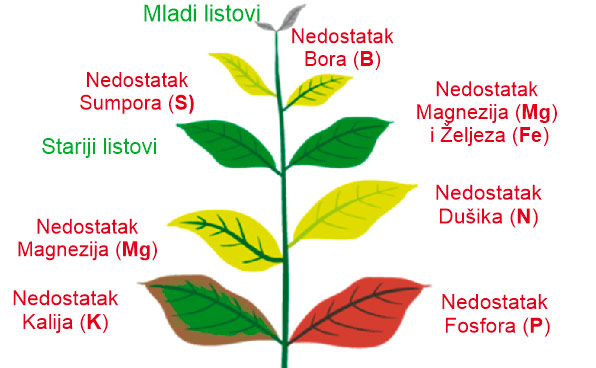Nutrients Deficiency in plants

IMPORTANCE OF MACRO AND MICRO ELEMENTS IN THE DEVELOPMENT OF PLANTS
Nitrogen (N)
It contributes to the formation of leaves and stems, affects the physiological function of yield and quality of the same. Nitrogen is the major protein and chlorophyll component that changes the sun’s energy into usable energy, and plants can easily be adopted. Plants use most nitrogen in the vegetative growth phase.
Phosphorus (P)
It has a major role in the flowering of plants, root development, and the formation of fruit. Phosphorus is an energy transfer agent in the plant. It also plays a role in cell formation, tissue tissue development, organic substrate formation, and the like.
Potassium (K)
Potassium increases the quality, taste, smell and color of fruits. It enables balanced osmosis in plants. Lack of potassium and water at the plant causes increased stress. Potassium improves the development of the crown and increases plant resistance due to lack of water. It plays an important role in the formation of proteins, carbohydrates and lipid formation.
Kalcij (Ca)
Kalcij ima ulogu jačanja stanične stjenke. Dakle, kalcij čini biljke jake protiv abiotičkog stresa. Također ima važnu ulogu za razvoj korijena i intenzivnog rasta i diobe stanica. U njegovom nedostatku, korijen i rast biljke postaju slabi ili se potpuno zaustave. Prilikom nedostatka u voćarstvu i povrtlarstvu plodovi omekšaju i izgube svoju otpornost.
Magnesium (Mg)
Magnesium is found in the chlorophyll structure. It also has its role in plant photosynthesis, and its deficiency can be related to fruit development, and poor growth potential of the plant.
Sumpor (S)
It affects yield and quality, and for different plant functions. It also works in protein and enzymatic functions of the plant.
Iron (Fe)
It plays a major role in the formation of chlorophyll, and also in the formation of proteins and carbohydrates, cellular respiration and enzyme activity.
Zinc (Zn)
It plays a very important role in the activity of hormones and chlorophylls in the plant. He is responsible for water intake and its usability. Enhanced phosphorus fertilization leads to a lack of zinc in soils rich in potassium and limestone soils. The disadvantage can still be observed in slow growth, in short and deformed leaves.
Copper (Cu)
It is very much needed for the synthesis of chlorophylls, and the easier transformation of water into the plant, and increases the quality of the sperm itself.
Magnesium (Mg)
It works together with iron in the synthesis of chlorophylls. It plays an important role in the enzymatic, protein and carbohydrate activities of the plant. In order to allow undisturbed plant growth, it is used with other microelements of copper, iron and zinc.
Boron (B)
A very important microelement in flowering and planting of fruits, allows the breeding of pollen to accelerate. The wine strengthens the cell walls of the plant, thereby increasing the plant’s own resistance. Lack of wrinkles causes the young peoples to die, as well as deformation and partial loss of paint on leaves.
Molybdenum (Mo)
It is important in the introduction of nitrogen and the exploitation of iron and phosphorus. In the absence of molasses, plants are exposed to soil disease infections, they may become dwarf growth, vein flowers, limiting vitamin C, thereby reducing the number of chlorophylls.
